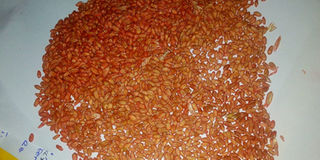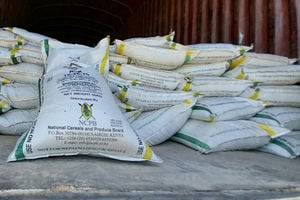Kephis impounds 6,000 bags of uncertified wheat seeds

Kenya Plant Health Inspectorate Service (Kephis) on March 23, 2018 impound 6,000 bags of uncertified wheat seeds worth Sh18 million in Narok South Sub-County. PHOTO | GEORGE SAYAGIE | NATION MEDIA GROUP
What you need to know:
- All seeds should bear Kephis labels and have a seal indicating the date of production and lifespan, an official said.
- Uncertified seeds are a major cause of food shortage as the seeds either do not germinate or produce poor crop.
- The seeds confiscated during the raid had been packed in 50kg fertiliser and sugar sacks.
Two people were arrested on Friday as Kenya Plant Health Inspectorate Service (Kephis) seized 6,000 bags of counterfeit wheat seeds worth Sh18 million in Narok South Sub-County.
South Rift Kephis seed inspector Ephraim Wachira said the seeds were seized with the help of the police in a warehouse belonging to a large-scale farmer at Nkorikori area.
CAUTION
“These two people are among others in this region who have taken advantage of the planting season in Narok to sell uncertified seeds to farmers,” said Mr Wachira.
Speaking to the press at Ololulunga Police Station where the seeds are stored, Mr Wachira said the agency is yet to establish how much of the uncertified seeds have already been planted.
He urged famers to be cautious when buying seeds not certified by Kephis as most of them do not germinate, while others give poor yield.
The seeds confiscated during the raid had been packed in 50kg fertiliser and sugar sacks and were ready for distribution to farmers in the region.
“Kephis officers unearthed the syndicate after they found a stockist selling the seeds at Masandare trading centre to unsuspecting farmers,” said Mr Wachira.
INVESTIGATIONS
Investigations by the agency indicated that prior to the raid the fake seeds had already been sold to farmers in the area, and in Ntulele and Melili, which are among the wheat growing belts in Narok County.
“All seeds should bear Kephis labels and further have a seal indicating the date of production as well as the lifespan.
“These fake seed sellers have also been the cause of food shortages that make Kenya spend billions of shillings on imports annually, and we ask farmers to be on high alert,” added Mr Wachira.
When buying seeds, farmers should scratch the silver-coloured seal on the packet to reveal a code. They should then send the code to 1393 and they will receive an immediate response from Kephis confirming if the seed is genuine, complete with a batch number and the region-specific variety.
SEEDS
Planting seasons in Kenya are characterised by high demand for certified seeds against a sometimes low supply.
As a result, shady seed merchants have been taking farmers for a ride by selling them uncertified seeds.
These seeds are packaged in similar packets as certified ones.
Farmers are urged to be cautious.





